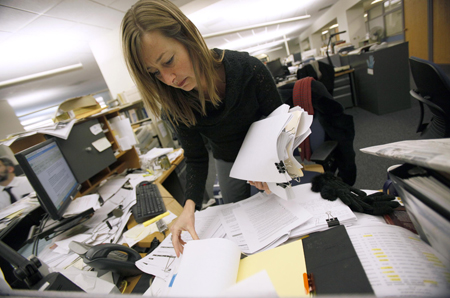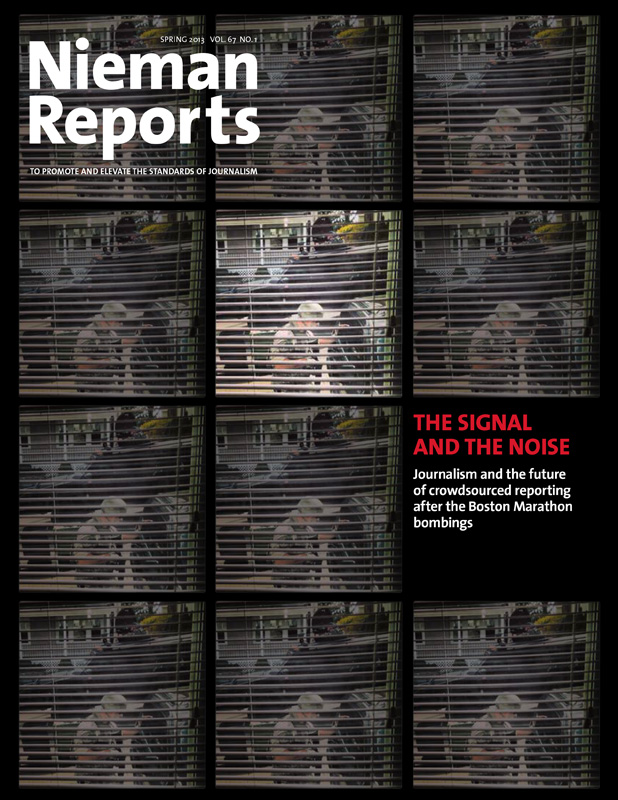
Photo by Kristyna Wentz-Graff/Milwaukee Journal Sentinel
Early one recent morning I fired off an e-mail to my managing editor, enraged that a story on the front page of our paper reported a 21 percent drop in the number of homicides in the first quarter of 2013. The story quotes the police chief and others patting themselves on the back and crediting their tactics. An accompanying photo depicts officers on the street, drawing further attention to “the news.”
The Milwaukee Journal Sentinel has built a reputation over the last six or seven years for its high-quality investigative work. We have a 10-member watchdog team and have dedicated resources to in-depth investigations on everything from pension scandals and public assistance fraud to dicey gun dealers and cozy relationships between doctors and drug companies. We spare little when it comes to scrutinizing government and its everyday impacts. Our attention to the Milwaukee Police Department is no exception.
Which is why I snapped at my son who wanted a fresh bowl of cereal (his first bowl had gone soggy) and nearly burned the eggs on the stove as I flipped to the jump hoping to find the context and analysis this story required.
Nothing.
Not a word about aggravated assaults, which experts agree is a far better measure of crime. Those numbers had jumped 33 percent last year.
No mention of our newspaper’s year-long investigation exposing how the police department had been manipulating data, classifying serious assaults as simple assaults that would not impact their reported crime numbers.
Topping it off, while the 21 percent is accurate, it’s statistically ridiculous; we were comparing 15 homicides this year to 19 during the same three-month period last year. Truth is, marksmanship and medical attention have more to do with the change in those numbers than anything else.
Yet crime data are important. They drive policing strategies and affect not only the public’s perception of the safety of their neighborhoods, but actual safety. And they can make or break the careers of mayors.
It’s our job to ensure the public gets the full and true picture, not to act as stenographers of spin or pseudo-information, as the late Murrey Marder called it. We got suckered on this one. We let a police department we have repeatedly exposed in recent months for generating false numbers distract attention from the real problems and lead readers to believe crime is down when, in fact, it isn’t.
It was no one person’s fault. From assignment to execution, this story slipped across the computer screens of a handful of seasoned journalists. It happens, though not much in recent years at the Journal Sentinel. As my husband, also a journalist at the paper, put it, “the forces of spin, deception and history revision do not end. That’s their job. They have an agenda to advance.” Those forces are patient and well prepared. Our challenge is staying on it.
Despite the shrinking size of many newsrooms, savvy editors in a growing number of places are—and should be—steering resources into watchdog journalism. It’s what our communities crave and something no other news outfit can typically provide, especially on the regional level. We can continue to be first with breaking news of shootings, stabbings and fires but, unless exceptionally newsworthy, we can brief them and link to our TV partners’ video of the raging flames and yellow crime tape. Or, we can quickly post our own video. We can then focus our attention on following paper trails, forging relationships with insiders, and solving puzzles that expose otherwise deeper and hidden truths. Without investigative journalism we are but clones of the forces that jeopardize our freedom and democracy.
So, whether we’re writing about nuclear weapons or murders in Milwaukee, the stakes are high. And reporters and editors at the Journal Sentinel know it. That’s why they are not afraid to acknowledge missteps. They know doing so only makes us better.
That’s one of the best things about working at this newspaper. The managing editor didn’t write back and defend the story or suggest I should keep quiet about it. He actually accepted responsibility and agreed: We need to do better. And we will. The proof will be landing at my doorstep, and at doorsteps around the country, in just a few hours.
Raquel Rutledge, a 2012 Nieman Fellow, is an investigative reporter at the Milwaukee Journal Sentinel.
MORE ON WATCHDOG REPORTING
From Shoe Leather to Big Data: ProPublica and the Future of Watchdog Journalism
By Robin Fields
Ask The Right Questions: MuckRock Makes FOIA Requests Easy
By Michael Morisy
Truth or Consequences: Where is Watchdog Journalism Today?
By Dan Froomkin
No Profession for Lone Wolves: Watchdog Reporters Need to Work Together
By Stuart Watson
Cross-Border Collaboration in Watchdog Journalism
By Stefan Candea
Let the Readers Know: How Journalists and the Public Can Work Together
By Ken Armstrong
In Korea, Watchdog Journalism Worth Watching on Television
By Chong-ae Lee
Do the Right Thing: Watchdog Reporters Handle a Bombing in Philadelphia
By William Marimow



